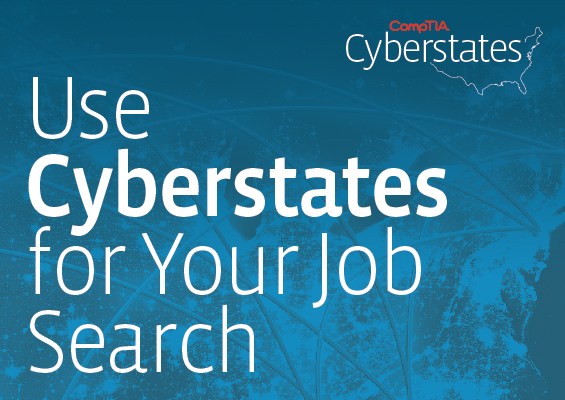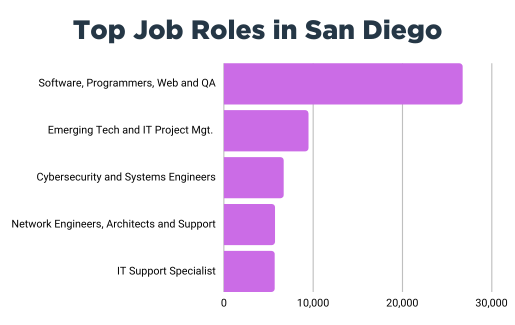 Even in the tech job landscape – where opportunities abound – locking down just the right role can be a challenge. That’s because tech pros, like anyone, are deeply individual in their situations, lifestyles, needs and expectations – and workplaces can be just as unique.
Even in the tech job landscape – where opportunities abound – locking down just the right role can be a challenge. That’s because tech pros, like anyone, are deeply individual in their situations, lifestyles, needs and expectations – and workplaces can be just as unique.
Since work is where we spend most of our days, finding the right tech job role is no small decision. Whether you’ve been trying to break into the tech world, attempting to find a new job you’re happier with or trying to change careers to IT from some other field, you’re doubtlessly aware of how much there is to think about.
But the 2023 CompTIA Cyberstates report can help make your decision more informed and a little easier. The annual report details the state of the tech job market on a state-by-state (and in some cases city-by-city) basis, giving you an unparalleled look into what skills are most in demand and what types of jobs are trending throughout the United States’ multifaceted tech job landscape. By folding this data into your job search, you can have a better picture of where your skills might best fit or what type of jobs you might find in a place you really want to (or have to) live.
Starting your job search with Cyberstates as a clear, factual foundation, you can have a stronger basis for finding a company with the right culture, the right wage/salary and all the other benefits that make a given job a place to stay. So, ask yourself the following questions while exploring Cyberstates to help you understand what you want and put you in a better position to get it.
What Type of Jobs Are in Your Area?
Knowing the IT fundamentals (and getting a CompTIA A+ certification) is always a best practice if you’re interested in getting in on the ground floor of the tech world. But if you’re looking ahead and planning your career, taking a look at the specific direction in which you can develop your skills to best meet the needs of your local job market is another.
In Alaska, for instance, network engineers, admins and support specialists dominate – so being able to build out and manage networks could position you for a successful IT career there.
![[images|OpenAccessDataProvider]4a5bb0b5-fd02-48d2-a7b0-2608aad489d8 Top Job Roles. Alaska](https://comptiacdn.azureedge.net/webcontent/images/default-source/blogs/top-job-roles-alaska.png?sfvrsn=286c87f0_2)
Other tech job markets, like San Diego, follow the national average more closely with the software developers and IT support specialists far outpacing any other occupation. In fact, there are more than seven times the number of people working in that area than in the lowest ranked area.

Take a look at the type of positions trending in your area in Cyberstates. From there, you can determine what skills to master for those positions and then hone in on your options by considering things like company size, industry and long-term opportunities versus stepping stones to build your skills.
How Many Tech Jobs Are Available?
In 2022, employers posted 4.1 million tech jobs in the United States, with the projected growth rate being nearly twice that of the national average. Comparing the number of job postings in your area to other areas of the country can help you see how much your local tech market is growing.
Five states stood out as adding the most tech jobs in 2022:
- California: +49,383 job postings
- Texas: + 42,431 job postings
- Florida: +26,849 job postings
- Illinois: +26,617 job postings
- Virginia: +25,120 job postings
If you live in or are looking to move to one of these states, it may be prime time to revamp your resume and see what’s out there. If you’re serious about your job search. CompTIA's career path planning tool can help you dive deeper into job role requirements and job posting and median salary data to help you determine what path is right for you.
What Sort of Salary Should You Be Asking For?
In an interview, when you’re asked about salary requirements, it can be an uncomfortable spot. Being able to gauge your own skill level and value your skills in financial terms can be difficult, especially if you’re just starting out in a field. Cyberstates adds an element of location data to your number crunching, and that can guide you to feeling more comfortable in discussing sometimes difficult issues like compensation.
Some of Cyberstates’ data probably confirms your suspicions – the jobs available in tech hubs like Silicon Valley and New York City offer higher pay on average than those in many smaller markets. An average wage of $116,773 in the greater NYC area or a whopping $155,111 in San Jose may make these big cities sound appealing for anyone hoping to pull in big money – but it’s not as simple as that.
First, that average wage encompasses everyone working in tech in that market – from the help desk to the CEO and from systems administrators to the sales team. So, before you ask for $130,000, dig deeper with tools like CompTIA's IT Salary Calculator to truly understand the going rate for your specific job role.
Second, when comparing regional averages, consider the cost of living. In places like New York City and San Jose you may earn a high wage, but you’ll also be paying a lot more for living expenses, like rent or mortgage, transportation and even food. And if you’re looking to move to one of these thriving tech hubs, know what type of environment you’re comfortable living and working in. The competitive job markets in areas like San Jose and New York City, the fast-paced (and sometimes unstable) culture of startups and the developer skillsets often demanded in that segment of the tech job market aren’t for everyone.
IT Certifications Are Always an Advantage
There are, of course, a ton of factors that go into finding the right job. Some are personal, like how willing you are to commute, whether you’re looking for a part-time or full-time job, or whether you perform better in an office environment or from home. Others depend on how you’ve managed to build your resume thus far. And the rest, like what jobs happen to be open when you’re looking, are based on pure luck.
But one thing is certain – no matter where you are, having the right tech skills makes you more employable, and CompTIA certifications can help you get there. Whether you’re looking for jobs in IT infrastructure and architecture or cybersecurity, the CompTIA Career Pathway validates the skills you need for your IT career. From the core skills covered by CompTIA A+, CompTIA Network+ and CompTIA Security+ to the specialty skills in the CompTIA Infrastructure Career Pathway and the CompTIA Cybersecurity Career Pathway, CompTIA can help you grow in your career and get to the next level.
Not sure where to go next? Take our quiz, What’s Your Certification Pathway?
Matthew Stern is a freelance writer based in Chicago who covers information technology, retail and various other topics and industries.

